'How did I not know this?’ CMS Summit 25 changed my understanding of AI

Among a diverse international collective of practitioners, vendors, and agencies, there were rich conversations about the challenges facing CMSes. There was also a big "ah-ha" moment that challenged my assumptions of AI in multilingual content management.
Tom Cranstoun, “The AEM Guy,” is the principal consultant at Digital Domain Technologies Limited and a CMS Critic contributor.
The Frankfurt skyline, the only city in Germany with skyscrapers, provided a fitting backdrop for two days of intense conversation about content management systems at the CMS Summit 2025, organized by Boye & Co.
This first European installment brought together a diverse mix of CMS practitioners, vendors, agencies, and analysts from across Europe and North America. My experience at the summit changed how I view the intersection of AI, CMS, and web technologies—areas that directly connect to my professional focus.
The State of Content Management in 2025
What struck me most was not the technical specifications of various platforms, but the rich dialogue about how organizations actually use these systems. A common challenge emerged across multiple sessions: the search for a perfect "all-in-one" solution often leads to disappointment.
Several presentations addressed this directly, noting that good technology alone doesn't guarantee success. Speakers described how quickly new requirements can reveal limitations in even the most promising systems. This observation was reinforced by cautions against purchasing tools before clearly defining the problems they should solve. The recommendation to view technology "not as a solution but as an enabler" resonated with many attendees, myself included.
AI Integration: Substance Over Spectacle
The discussion around AI and content management stood out for its practicality. Rather than focusing on theoretical applications, presenters addressed real implementation challenges.
Sessions on AI integration cut through typical enthusiasm with a focus on creating genuine value. Speakers emphasized that successful AI implementation depends less on impressive features and more on building user trust and achieving measurable outcomes.
Several talks provided valuable insights on how AI systems interact with CMS-powered content, highlighting current limitations and offering concrete approaches to help AI better understand structured content—a critical consideration as these technologies become more deeply integrated. In full transparency, I was one of the speakers and I moderated one of the workshops, “Trust in AI”.
"How Did I Not Know This?"
The most profound insight came during the "Trust in AI" and "Building Products with AI" workshops, where a startling realization emerged that changed my understanding of AI in multilingual content management: Non-English speakers experience AI differently. And those of us in the English-speaking tech world rarely understand this.
“Non-English speakers experience AI differently. And those of us in the English-speaking tech world rarely understand this.”
As someone familiar with AI bias discussions, I thought I understood the landscape. Yes, AI has a Western tilt. Yes, models reflect dominant ideologies. But what I hadn't fully grasped until this summit was the structural exclusion of non-English perspectives from the foundation upwards.
In the European context, where linguistic diversity is lived rather than theoretical, this observation gained immediate traction. As we discussed AI implementation in content management systems, participants from various countries shared starkly different experiences with the same AI tools—experiences shaped primarily by language.
The technical explanation proved equally eye-opening. Most large language models powering today's AI features in CMS platforms are trained on Common Crawl, a public dataset that scrapes vast portions of the web. Approximately 44% of this content is in English, with no other language exceeding 6%. German, Spanish, French, Russian, Japanese, and Chinese are present, but minimally so. The remaining global languages are virtually absent.
A couple of anecdotes from the side chatter further underscore this challenge in both artificial intelligence and machine translation, particularly when dealing with nuanced languages like German.
Lars Trieloff's remark, "His English is Better than AI's German," while perhaps humorous, highlights the limitations of AI in achieving natural and idiomatic language proficiency. This suggests that even with advancements in AI, human expertise remains essential for tasks requiring linguistic finesse.
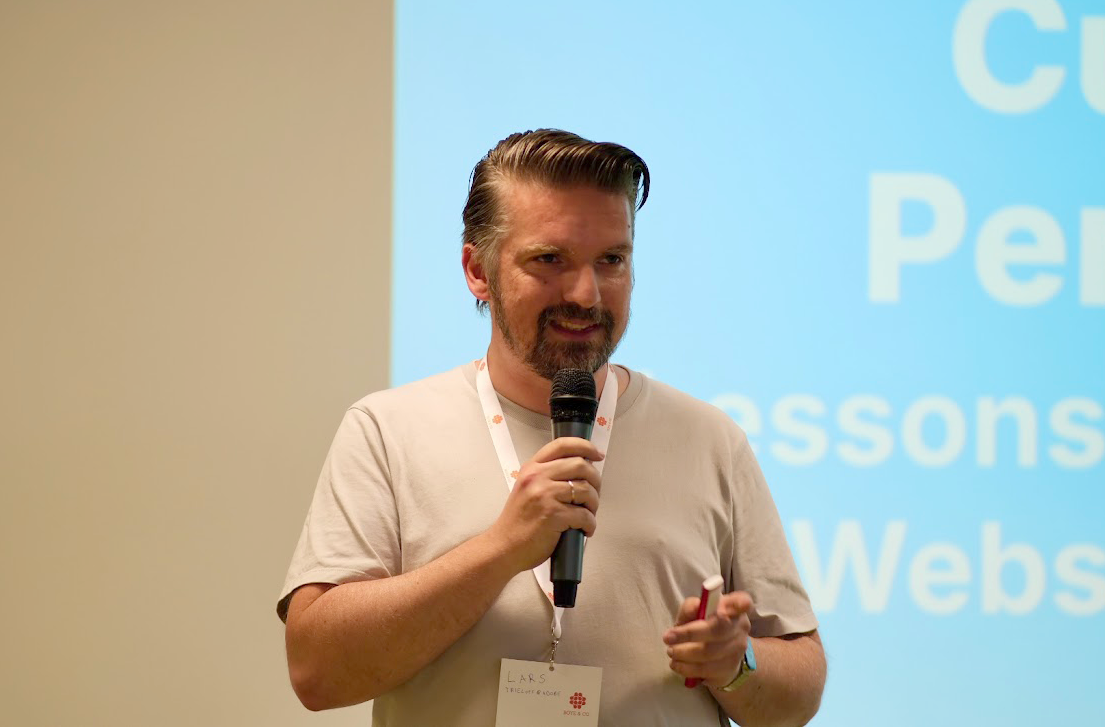
Lars Trieloff, principal at Adobe. Photo Source: Marta Cukierman
Angelika Gust's experience further emphasizes this point. Her workflow, involving an "Experiment in AI," necessitated the active participation of native German speakers. Their role was crucial in rectifying the "stilted German" generated by the AI, indicating that while AI can be a useful tool in translation, it often falls short of producing text that is both grammatically correct and stylistically natural.
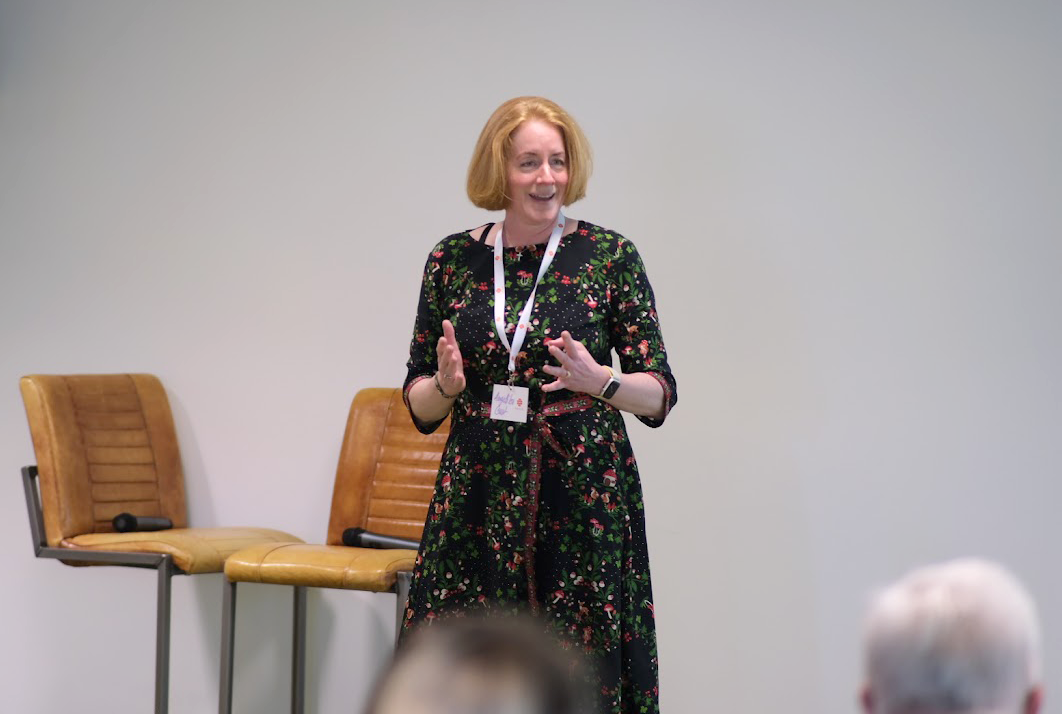
Angelika Gust, Senior Product Manager, Digital Channels at DB Regio. Photo Source: Marta Cukierman
These real-world examples serve as a potent reminder that achieving truly human-quality language generation and translation remains a hurdle for artificial intelligence. The need for human oversight and correction is not just a matter of preference but a practical necessity for ensuring accuracy and quality.
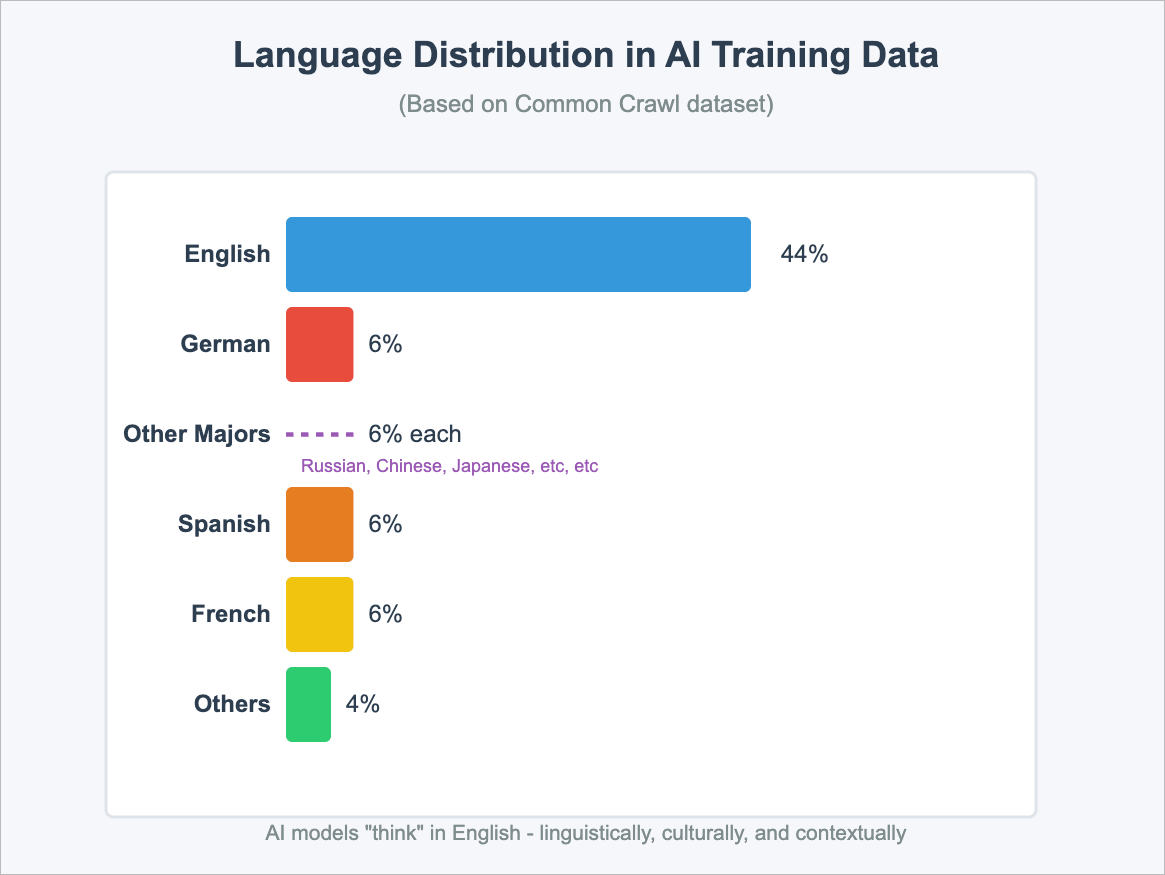
This imbalance creates models that "think" in English—not just linguistically, but culturally and contextually. For CMS implementations serving multilingual audiences, this poses significant challenges. Content created or augmented by AI in non-English languages often exhibits lower quality, cultural misalignments, and reduced effectiveness.
Don’t forget that the system prompt is also written in English, the UI and front end often sneak in tricks by looking for text like ‘think deeply” in the prompt and then adjust the model's output.
Wow. Perhaps everyone should prompt in English! I hope not.
Common Crawl's architecture compounds the problem by prioritizing highly-linked domains, which overwhelmingly come from the English-speaking West. Already-dominant voices are further elevated, while content from smaller, less networked communities is ignored. This is particularly problematic for CMS implementations serving diverse global audiences.
The contrast with established institutional approaches was striking. The United Nations publishes all official documents in six languages. The European Union recognizes 24 official languages and mandates linguistic equity across communications. Yet our content management systems, increasingly powered by AI, lag significantly behind this standard despite serving the same diverse populations.
Another layer of systemic imbalance arises in how AI systems are fine-tuned. Reinforcement Learning from Human Feedback (RLHF), the technique used to refine language models, is overwhelmingly English-centric. This creates:
- Perspective Narrowing: Models reflect Anglophone values and social assumptions
- Language Exclusion: Many global languages receive no feedback at all
- Digital Colonialism: While the Global South provides labour and data, the benefits and governance remain concentrated in the Global North
- Outdated non-native English: The global south was decolonised in the 1950s, their English language was often a second language, used as a link language; it has not kept up with modern English.
What made this revelation particularly impactful was its obviousness in retrospect. As someone who has worked extensively with content management systems, I found myself wondering:
“How did I not know this?”
Digital Sustainability Emerges as a Core Concern
The conference marked a shift toward acknowledging the environmental impact of digital solutions. Presentations offered compelling data on the growing carbon footprint of websites, applications, and AI systems.
Speakers noted that building more climate-friendly digital experiences benefits both the planet and business outcomes. Several vendors and agencies have begun incorporating sustainability metrics into their development practices, signaling a potential industry-wide shift in priorities.
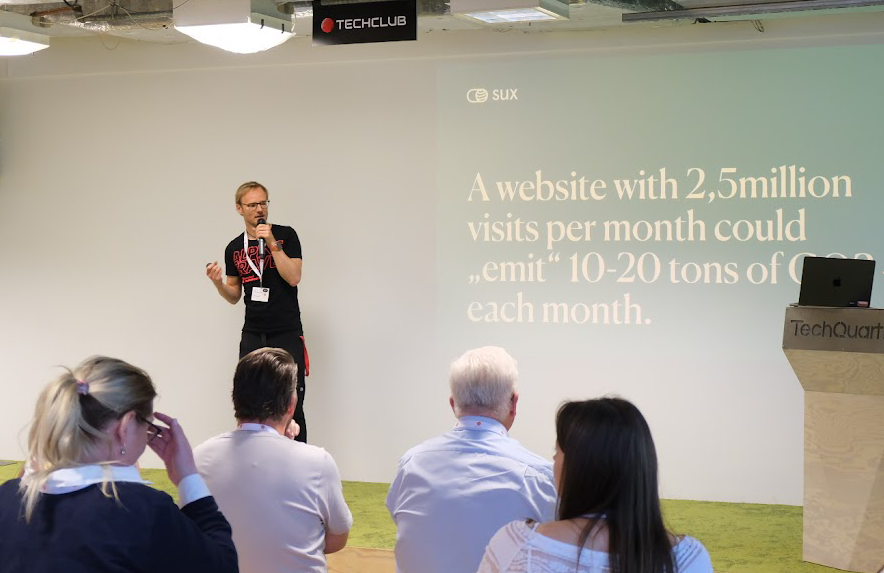
Thorsten Jonas presenting “The Time is Now for Web Sustainability.” Photo Source: Marta Cukierman
This focus on sustainability connects directly to questions about resource allocation and efficiency—particularly relevant as content management systems grow more complex and data-intensive.
Collaborative Problem-Solving
The second day shifted from presentations to working groups addressing pressing industry questions. Topics included building products in the age of AI, future-proofing content across multiple platforms, and establishing accuracy and trust with AI systems.
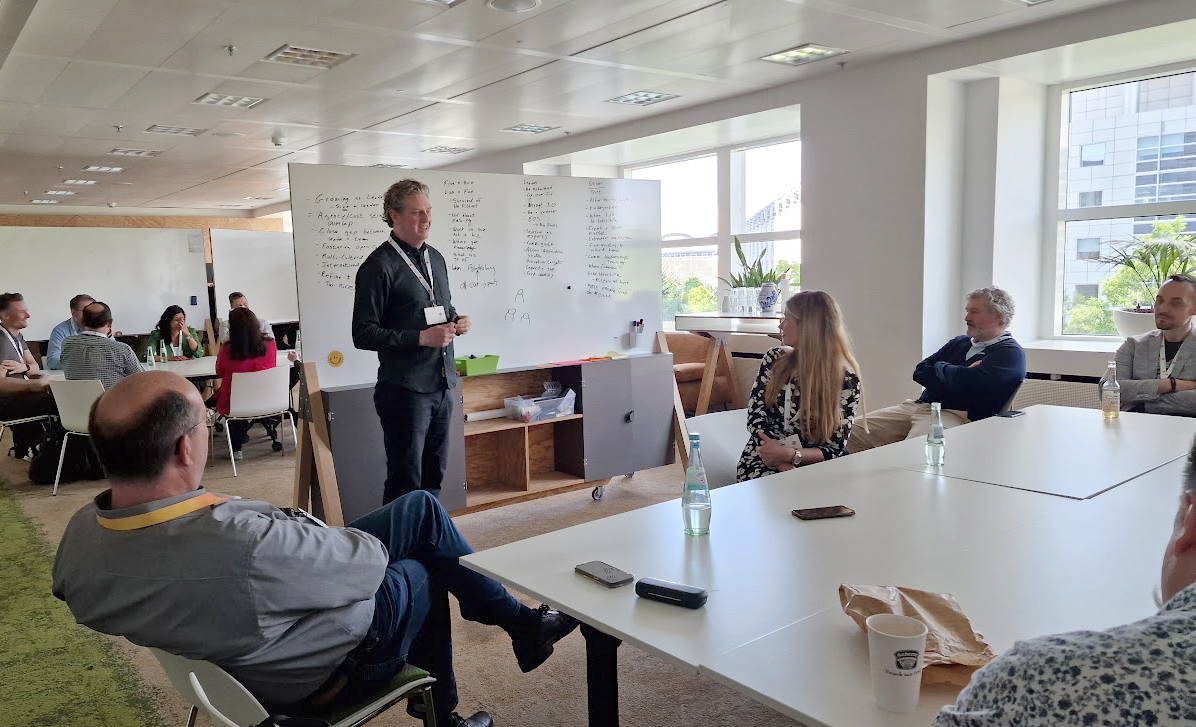
Julian Mills facilitating one of the day two workshop sessions. Photo Source: Janus Boye
This format created space for substantive cross-organizational dialogue, allowing participants to share challenges and strategies from different perspectives. Many attendees noted this collaborative approach as particularly valuable compared to the experience of traditional conferences.
Reflections and Forward Movement
Looking back on the summit, what remains most valuable are the connections formed with other practitioners facing similar challenges. The conversations during breaks and social events often yielded insights as valuable as the formal sessions.
For those working at the intersection of content management and emerging technologies, the path forward requires both technical expertise and strategic vision. We're navigating an industry-wide transformation driven by technological changes that pressure vendors, agencies, and clients alike.
The multilingual AI revelation particularly calls for a shift in how we approach AI integration in content management. If we truly want AI-enhanced CMS to serve global audiences, then we need:
- Training data that's representative, multilingual, and culturally nuanced
- Evaluation processes that account for linguistic diversity
- Governance structures that include voices from all markets served
- More inclusive, ethically curated datasets
- Feedback systems reflecting a genuinely global range of human values
- Movement beyond tokenism into structural equity
The next European CMS Summit is scheduled for May 12-13, 2026, again in Frankfurt. Based on the quality of this year's event, it promises to provide another opportunity for meaningful exchange across the global CMS community.
If you're based in North America, you can also join CMS Connect in August or CMS Kickoff in January. And finally, the conversation continues in the CMS Expert Groups, where Chief Critic Matt Garrepy is also an active community leader.
This post represents my personal takeaways rather than a comprehensive report. I extend my gratitude to all speakers, demonstrators, and fellow attendees for two days of inspiring dialogue and discovery.
Upcoming Events

Contentstack ContentCon 25
June 3-5, 2025 – Chicago, USA
The future of digital is waiting for you! Contentstack presents ContentCon, the premier event for digital teams and industry leaders who are reimagining the future of digital experiences. Join us for two days of transformative presentations and workshops designed to help you put personalization and AI strategies into action. Register today!

CMS Connect 25
August 5-6, 2025 – Montreal, Canada
We are delighted to present the second annual summer edition of our signature global conference dedicated to the content management community! CMS Connect will be held again in beautiful Montreal, Canada, and feature a unique blend of masterclasses, insightful talks, interactive discussions, impactful learning sessions, and authentic networking opportunities. Join vendors, agencies, and customers from across our industry as we engage and collaborate around the future of content management – and hear from the top thought leaders at the only vendor-neutral, in-person conference exclusively focused on CMS. Space is limited for this event, so book your seats today.